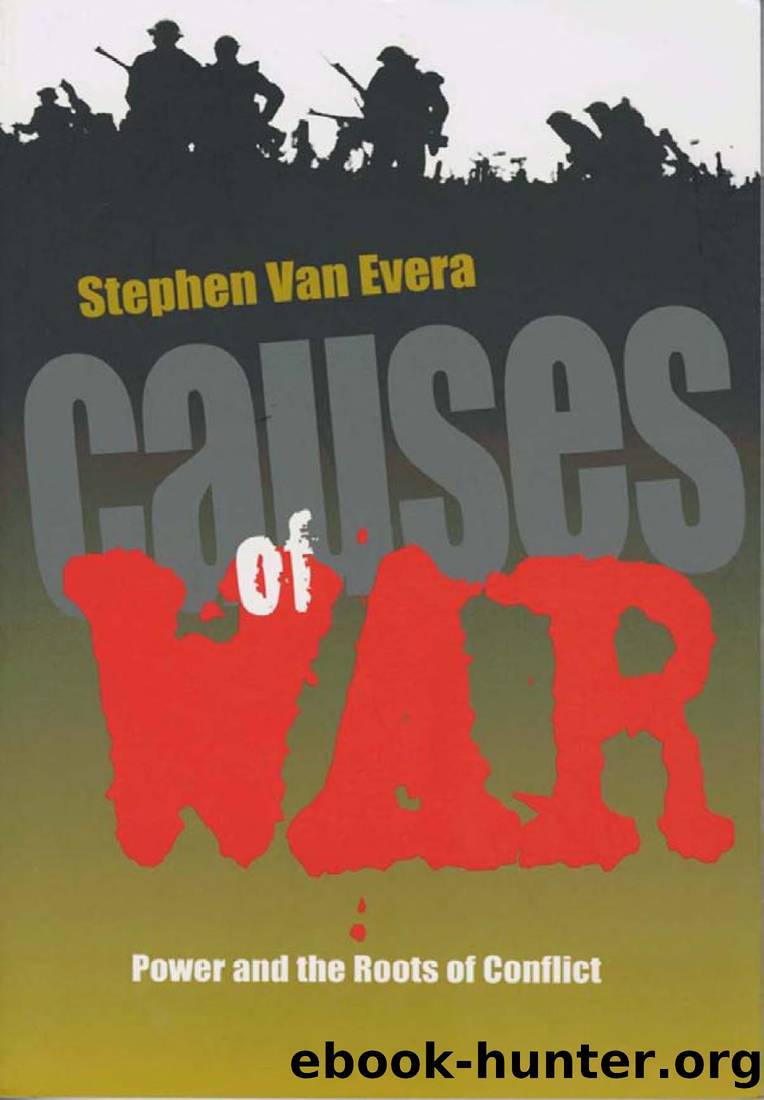Causes of War: Power and the Roots of Conflict by Stephen van Evera

Author:Stephen van Evera [Evera, Stephen van]
Language: eng
Format: epub
Tags: History, International Relations, Military, Political Science, Security, Theory
ISBN: 9780801467189
Google: i08gUtnQFm0C
Amazon: B00B1O3AS8
Publisher: Cornell University Press
Published: 2013-01-14T00:00:00+00:00
States are more secretive (explanation H5H)
When conquest is easy, governments cloak their foreign and defense policies in greater secrecy. An information advantage confers more rewards, and a disadvantage raises more dangers: lost secrets could risk a state’s existence. Hence states compete for information advantage by concealing their foreign policy strategies and their military plans and forces.
Openness with military and foreign policy information has benefits. States can better deter enemies by displaying their power. They can reach more arms control agreements and better avoid arms racing if they keep few secrets. Their policies will be better evaluated if their policymakers consult a wide circle of experts. Other powers are less likely to inadvertently injure national interests that are openly framed and explained.
When the offense dominates, the dangers of openness can outweigh these advantages, driving states back to secrecy. An open policy risks revealing secrets that give an enemy the keys to total victory. States also grow more concerned that agreements to share information be equal, impeding agreement to exchange information or permit mutual reconnaissance. States ask, Who gains more from openness? instead of Do we both gain? So agreements to foster openness must be more nearly equal before the “loser” agrees.
All the European powers enshrouded their policies in dark secrecy during the heyday of the “cult of the offensive” before 1914 (on the cult see Chapter 7). Everywhere, writes Sidney Fay, military plans “were worked out and guarded in such absolute secrecy” that “they were often not even known to the Minister of Foreign Affairs.”69 The German war plan was so secret that German Chancellor Bethmann-Hoilweg, Secretary of State Jagow, Admiral Tirpitz, and probably even the kaiser were unaware that it required an immediate surprise attack on Belgium once German mobilization began.70 In Britain, Foreign Secretary Edward Grey knew nothing of plans for Franco-British military cooperation being evolved by the military staffs during 1906–11.71 In Austria the army chief of staff, Franz Conrad von Hötzendorff, and his senior military officers shared little intelligence information with other officials. Civilians were allowed fragments of information, but no government agency assessed the information collectively.72 In Russia, the military held a monopoly of information and withheld crucial data from civilians, leaving the Ministry of Foreign Affairs ignorant of the state of the army.73 As one historian notes, this secrecy fostered “mutual incomprehension between statesmen and soldiers.”74
In the Cold War, tight secrecy on both sides during the 1940s and 1950s gave way to far greater openness as a defense-dominant military order emerged and deepened in the 1960s and 1970s. President Truman enforced a policy of secrecy on all nuclear matters.75 All Atomic Energy Commission reports to President Eisenhower on the arsenal were given verbally, to avoid leaving a paper record.76 Soviet secrecy was even tighter, also from fear that the United States could wring advantage from any knowledge it gained.
Once both sides developed secure nuclear deterrents, the fear of disclosure diminished. Neither side could possibly conquer the other, with or without access to the other’s secrets. Hence both had less to fear from openness.
Download
This site does not store any files on its server. We only index and link to content provided by other sites. Please contact the content providers to delete copyright contents if any and email us, we'll remove relevant links or contents immediately.
| Arms Control | Diplomacy |
| Security | Trades & Tariffs |
| Treaties | African |
| Asian | Australian & Oceanian |
| Canadian | Caribbean & Latin American |
| European | Middle Eastern |
| Russian & Former Soviet Union |
The Secret History by Donna Tartt(16624)
The Social Justice Warrior Handbook by Lisa De Pasquale(11489)
Thirteen Reasons Why by Jay Asher(7788)
This Is How You Lose Her by Junot Diaz(5773)
Weapons of Math Destruction by Cathy O'Neil(5037)
Zero to One by Peter Thiel(4824)
The Myth of the Strong Leader by Archie Brown(4789)
Promise Me, Dad by Joe Biden(4447)
Beartown by Fredrik Backman(4419)
Stone's Rules by Roger Stone(4415)
How Democracies Die by Steven Levitsky & Daniel Ziblatt(4399)
The Fire Next Time by James Baldwin(4343)
100 Deadly Skills by Clint Emerson(4079)
A Higher Loyalty: Truth, Lies, and Leadership by James Comey(4033)
Rise and Kill First by Ronen Bergman(4012)
The David Icke Guide to the Global Conspiracy (and how to end it) by David Icke(3882)
The Farm by Tom Rob Smith(3872)
Secrecy World by Jake Bernstein(3782)
The Doomsday Machine by Daniel Ellsberg(3731)
